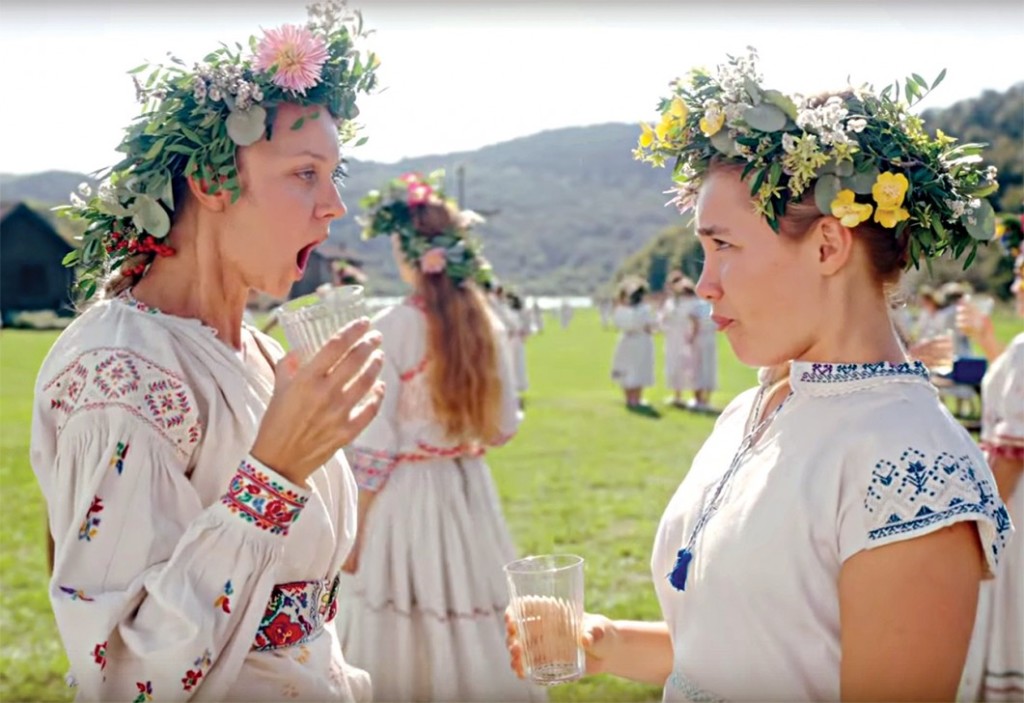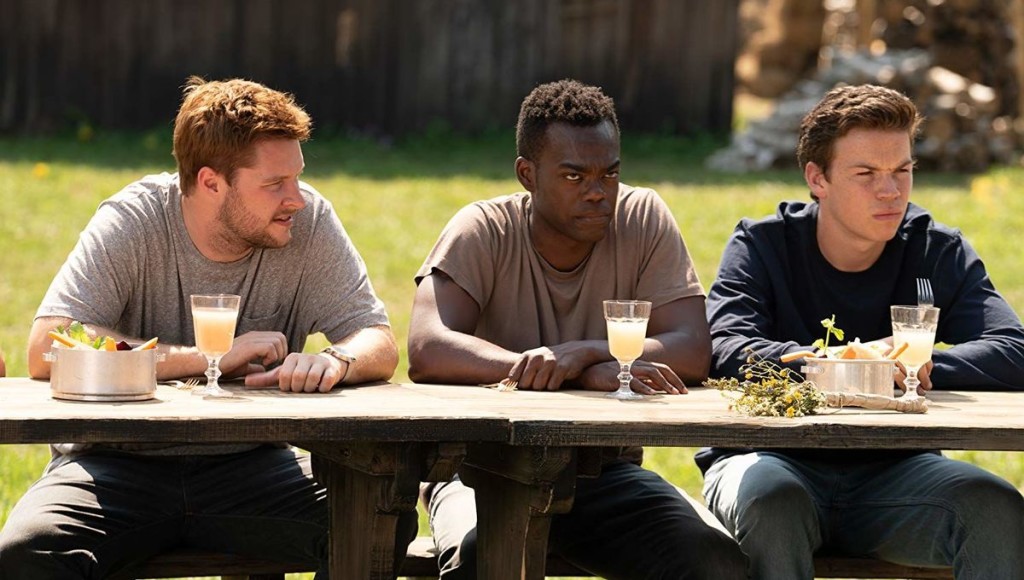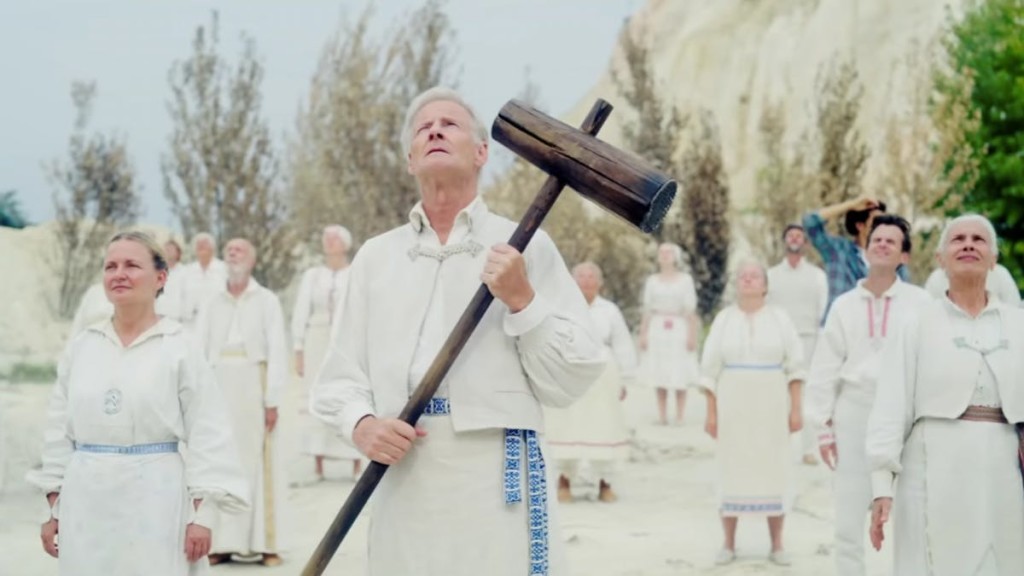Genre: Horror
Premise: (from IMDB) A group of friends travels to Sweden to attend a reclusive mid-summer festival. What begins as an idyllic retreat quickly devolves into an increasingly violent and bizarre competition at the hands of a pagan cult.
About: Writer/Director Ari Aster was anointed to “next big thing” status when his intense not-for-everyone film, Hereditary, became indie studio A24’s biggest movie ever. Aster didn’t waste any time, using the buzz to launch his next project, Midsommar, immediately. The film didn’t perform as well as hoped, making $27 million domestically compared to Hereditary’s $44 million. Still, Aster’s now loyal following loved it, and it’s expected to do very well on digital.
Writer: Ari Aster
Details: 150 minutes!
I resisted seeing this when it came out because it was written and directed by Ari Aster, the writer of the worst screenplay ever, Hereditary.
But conflict lives deep within my heart as I’ve always wanted a great modern day horror film about cults. And while I despised the screenplay for Hereditary, I had to admit its trailer exhibited a talented directing eye. Then Martin Scorsese spent 30 minutes of a recent Q&A talking about how much he loved Hereditary and I finally said, “You know what. I’m going to see if this guy learned anything about screenwriting since his last film,” and popped Midsommar into the old Apple TV.
The premise for the film is a simple one. A 20-something girl, Dani, loses her sister to suicide. Incidentally, the carbon monoxide she used to kill herself also leaked into her parents’ room and killed them too. So Dani is one family down.
Her grad school boyfriend, Christian, is tagging along with his Swedish friend, Pelle, and a couple of other guys, to check out a mid-summer festival in Pelle’s rural Swedish village. Dani decides to join them and off they go.
There’s a strong Heaven’s Gate vibe to the white-clothed hippy community and yet nobody thinks to turn and leave. They can’t, of course, or else there would be no movie.
The people there seem nice (don’t they always), and invite everyone to a ceremony where two elders are brought to an overarching cliff to speak to everyone. Except they don’t say a word. They JUMP! And die. Splat.
In real life, our characters would sprint to the nearest airfield and stow away in the landing gear if it got them away from this psychotic Swedish Manson cult. But no, our characters choose to stay and see what these wily Swedes are up to next. Naturally, these things turn out to be nefarious and one by one, our characters die in awful ways.
Before we get to the script stuff, lots of people were surprised that this film didn’t do as well as Hereditary. Yet the reason is simple: It’s hard to pull horror off in the daylight. You can do it with zombies. But you can’t do it with much else.
The reason horror works so well is because the darkness activates the imagination. It offloads the work from the movie to the viewer. They get to fill in their own fears with what’s in the corner of the dark room, what’s at the bottom of the dark basement stairway, who that shadow belongs to at the end of the dark hallway.
You don’t get any of that with daylight. So you have to find your horror elsewhere, and that can be challenging. So when you see this big bright movie that’s being advertised as a horror film, it’s confusing. And people aren’t going to show up to confusing. They want a good idea of what they’re walking into.
Now from a cinematic perspective, Aster’s choice is exciting. There’s irony in the search for fear in daylight. And outside of some annoying directing choices, Misommar works. That’s because every viewer knows this place is bad news. So as long as you keep a log on the fire for the next looming threat, we’re going to be into it.
Surprisingly, the thing that makes Aster a bad writer also helps him. When your narratives are weak and unfocused, as both this and Hereditary are, it gives the story a natural unpredictability. If you’re not following any common act or scene beats, we’re not going to know what’s coming next. And that’s why I kept watching. I had no idea where this was going.
Aster also put a lot of work into the mythology of this village and it paid off. I trusted that whenever something happened that was tied to this place’s weird rules, it was authentic, because I could tell Aster did his homework. I mean there’s a giant barn where the entire inside is covered in a historic mural of this clan’s history. You can’t make that sort of thing up on the fly. You have to know it and convey it to the art department.
Which is what makes this movie so frustrating. If Aster took some time to learn screenwriting, he would be unstoppable. Cause as a visual storyteller, he’s quite talented.
To give you an idea of what I mean by bad writing, Christian comes up to one of the friends after the two elders kill themselves and tells him he wants to write his thesis paper on this clan. The friend gets mad, replying, “I told you already. I was writing my thesis about this place!” Not only did I have no idea that either of these two were writing theses before this moment. But I didn’t even know they were in school. That’s how poor the writing was. We’d find out major story components after the fact.
There were all sorts of character issues here. Why doesn’t Pelle warn his best friends that they’re about to watch two people kill themselves? Why wouldn’t he brace them for that? Tell them that if it’s too much, they might want to sit the ceremony out? I’ll tell you why. Because if he did, Aster wouldn’t have been able to write the scene.
A bad writer says, “Well I’m just going to do it anyway.” A good writer says, “I have to figure out a believable way in which he wouldn’t tell them.” Why do bad writers always go with the former? Because it’s eaasssssyyyyyieeer!! It’s easier not to do the work! Are you telling me I may have to sit down several hours a day for a few days until I come up with a believable reason for why my character wouldn’t warn his friends about this? Screw that. It’ll take too long!
But I think Aster’s taught me the secret to getting these daytime horror movies right. Just follow two rules. One, be weird. Be really really weird. You don’t have the darkness to hide behind so, instead, have a bunch weird crap happen. This is why Wicker Man is still the champion of this sub-genre. You’d have little kids joyously singing about sex through choreographed dances. Or naked women singing about boning you while banging on the other side of your hotel room wall.
The other tool to use is shock. And this is something Aster is becoming known for. I mean he killed a main family member in his last film by having her stick her head out the window and get it decapitated by a telephone pole. Watching an uninterrupted shot of a woman jumping to her death and her head splattering over a rock in real-time certainly jolted me awake.
Now Aster just needs to figure out character. I had no idea who Christian was throughout this. None. Is he a good boyfriend who will do anything for Dani? Is he a bad boyfriend who takes her for granted? Every scene would vacillate between those two extremes to ensure that you never knew the guy.
Seasoned screenwriters know that if a character is unclear, you go back to their introductory scene and you use that scene to make it abundantly clear who the character is. When we meet the Joker, what is he doing? He’s looking in a mirror desperately trying to squeeze his lips into a smile. I know more in three seconds of that scene about that character than I do about Christian from watching this entire movie. That says something.
I’m going to log this as a step forward for Aster. It’s more interesting than Hereditary. And I watched til the end, which says a lot since this is 150 minutes. But keep working on your writing man. Or find a screenwriter you connect with. That could really skyrocket your career.
[ ] What the hell did I just watch?
[ ] wasn’t for me
[x] worth the rental
[ ] impressive
[ ] genius
What I learned: Here’s a simple test to see if your characters are acting realistic or not. If you were in their shoes, would you do it? If you had just watched two people jump to their death in a pagan ritual, would you stay for another three days? Or would you leave? If the answer is leave (which it is), then you need to come up with a realistic reason why the characters would stay. (This is why so many horror films have their characters stuck somewhere. That way, they never have to worry about this question)





